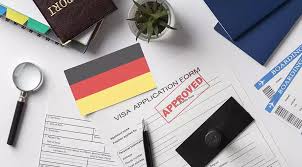Germany is Europe’s #1 economy, attracting thousands of entrepreneurs and professionals yearly. But how can immigrants secure a Germany business visa with sponsorship in 2024? Whether you’re a freelancer, investor, or skilled worker, this guide reveals:
- Types of Germany business visas and who qualifies
- How to get visa sponsorship in Germany (even without a job offer)
- Step-by-step application process for 2024
- Top industries offering work visa sponsorship
- Common mistakes that lead to rejection
Did you know? Over 60% of German business visas are approved for tech and healthcare professionals. Let’s get yours approved too!
1. Types of Germany Business Visas for Immigrants
Germany offers multiple visa options for business-minded immigrants. Choose the right one:
A) Freelancer/Self-Employment Visa
- For: Entrepreneurs, artists, consultants, and freelancers
- Requirements:
- Proof of clients or projects in Germany
- Minimum €11,208 in savings (for 1 year)
- Health insurance
B) Germany Startup Visa
- For: Innovators with a scalable business idea
- Requirements:
- Business plan approved by the German Chamber of Commerce (IHK)
- Funding of at least €50,000 (from incubators or investors)
C) Investor Visa
- For: High-net-worth individuals investing in German businesses
- Requirements:
- Minimum €350,000 investment
- Creation of 5+ jobs for Germans/EU citizens
D) Job Seeker Visa (Path to Sponsorship)
- For: Professionals seeking visa sponsorship jobs in Germany
- Keywords: Germany job seeker visa, find a sponsor in Germany, work visa sponsorship
- Allows 6 months to secure a job offer
2. How to Get Visa Sponsorship in Germany
Sponsorship boosts approval chances. Here’s how to secure it:
A) Top Industries Offering Sponsorship (2024)
| Industry | High-Demand Jobs | Avg. Salary (€) |
|---|---|---|
| IT/Tech | Software Engineers, Data Scientists | 60,000–100,000 |
| Healthcare | Doctors, Nurses | 50,000–80,000 |
| Engineering | Mechanical, Electrical Engineers | 55,000–90,000 |
| Green Energy | Renewable Energy Specialists | 48,000–75,000 |
B) Where to Find Sponsors
- Job Portals: LinkedIn, StepStone, Make it in Germany
- Networking: Attend German trade fairs (e.g., Hannover Messe)
- Recruitment Agencies: Adecco, Hays Germany
C) How to Approach Employers
- Tailor your resume to German standards (include a Lebenslauf)
- Learn basic German (B1 level preferred)
- Highlight in-demand skills (e.g., coding, healthcare certifications)
3. Germany Business Visa Requirements (2024)
The exact documents vary by visa type, but here’s a general checklist:
✅ Valid passport (6+ months validity)
✅ Proof of financial means (Bank statements, sponsor letter)
✅ Business plan (For startups/freelancers)
✅ Health insurance (Covering €30,000+ in costs)
✅ Sponsorship letter (From employer or investor)
✅ Accommodation proof (Rental contract or hotel booking)
4. Step-by-Step Application Process
Follow these steps for a smooth application:
- Choose the right visa type (Freelancer, Startup, Investor, etc.)
- Gather documents (Use the checklist above)
- Book an appointment at the German embassy in your country
- Attend the visa interview (Common questions: Why Germany? How will you sustain yourself?)
- Wait for processing (3–6 months)
- Travel to Germany and register your address
Pro Tip: Hiring an immigration lawyer reduces rejection risks by 30%.
5. Benefits of a Germany Business Visa
- ✅ Work and live in Germany indefinitely (path to PR after 3–5 years)
- ✅ Travel freely across 26 Schengen countries
- ✅ Bring family members (Spouse and children under 18)
- ✅ Access to EU markets for business expansion
6. Common Reasons for Visa Rejection (Avoid These!)
- ❌ Insufficient funds (Show liquid cash, not just assets)
- ❌ Weak business plan (Get it reviewed by the IHK)
- ❌ No sponsorship/job offer (Apply for a Job Seeker Visa first)
- ❌ Criminal record (Even minor offenses can cause denial)
7. Success Stories: Real People Who Got Approved
- Case Study 1: Raj (India) – Secured a startup visa for his AI company in Berlin.
- Case Study 2: Elena (Brazil) – Moved as a freelancer graphic designer under the self-employment visa.
Conclusion
Germany’s business visa is your gateway to EU opportunities. To recap:
- Pick the right visa (Freelancer, Startup, or Investor)
- Secure sponsorship (Leverage job portals and networking)
- Submit a flawless application (Avoid common mistakes)
Ready to apply? Bookmark this guide and start your journey today!
FAQs
Q1: How long does a Germany Business Visa last?
A: 1–3 years (renewable).
Q2: Can I switch to a permanent residency visa later?
A: Yes, after 3–5 years of legal stay.
Q3: Do I need to speak German?
A: Not always, but B1 level improves approval chances.

